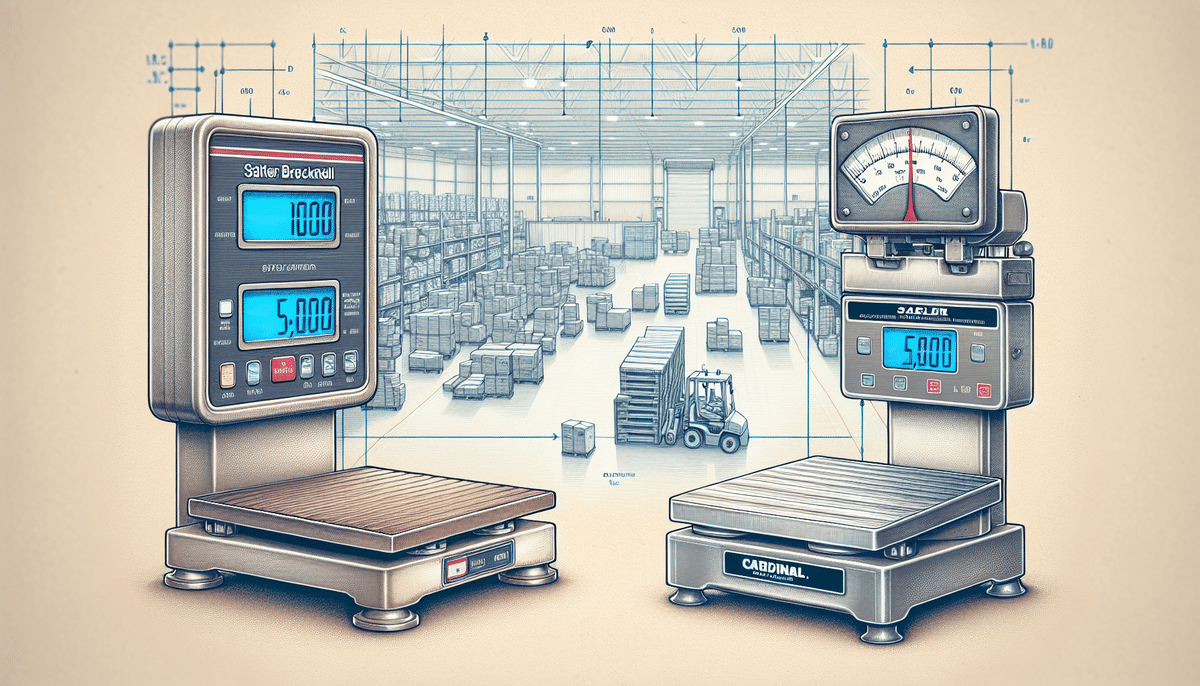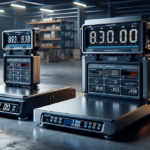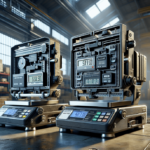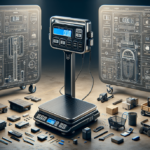Salter Brecknell PS1000 vs Cardinal Scale: Comprehensive Weighing Scale Comparison
Choosing the right industrial weighing scale is crucial for your business operations. Among the top contenders are the Salter Brecknell PS1000 and the Cardinal Scale. This detailed comparison will help you make an informed decision by evaluating their features, performance, accuracy, durability, user-friendliness, and more.
Understanding the Basics: Salter Brecknell PS1000 and Cardinal Scale
The Salter Brecknell PS1000 and Cardinal Scale are both industrial-grade weighing scales, widely used in warehouses, factories, and shipping centers for weighing heavy and bulky items like pallets, crates, and bags.
The PS1000 offers high accuracy and durability with a capacity of up to 1,000 pounds. It features a large, easy-to-read display and can be powered by batteries or an AC adapter. Additionally, it includes a tare function for weighing items without container weight.
In contrast, the Cardinal Scale boasts a broader weight range, accommodating from small packages to large pallets. It includes advanced features like automatic zero tracking and a programmable auto-off function, making it a versatile choice for various industrial settings.
Key Features of Salter Brecknell PS1000 Scale
- Weight Capacity: Up to 1,000 pounds
- Platform Size: 48 x 48 inches stainless steel
- Display: Large, easy-to-read digital
- Power Options: Rechargeable battery and AC adapter
- Protection: Built-in overload protection system
- Portability: Built-in wheels and handles
The PS1000 is designed for ease of use with simple controls and an easy-to-clean surface. Its shock-resistant load cells ensure durability, making it suitable for industries like manufacturing, agriculture, and shipping. According to a 2023 industrial report, reliable weighing scales are essential in reducing operational errors and improving efficiency.
Key Features of Cardinal Scale
- Weight Capacity: Up to 5,000 pounds
- Platform Size: 60 x 60 inches stainless steel
- Display: Large digital display
- Power Options: AC and DC power
- Advanced Features: Automatic zero tracking, programmable auto-off, checkweighing, and accumulation
- Durability: Resistant to moisture, dust, and contaminants
The Cardinal Scale's robust construction is ideal for harsh industrial environments, ensuring long-term reliability and minimal maintenance. Studies have shown that advanced weighing technologies can enhance precision and operational flexibility in large-scale manufacturing processes (ScienceDirect).
Performance Comparison: Salter Brecknell PS1000 vs Cardinal Scale
Both scales offer high accuracy and reliability, but they cater to different needs:
- Salter Brecknell PS1000: Faster update rate and settling time, making it suitable for time-sensitive operations.
- Cardinal Scale: Greater versatility with multiple functions like checkweighing and accumulation, suitable for diverse applications.
In terms of capacity, the Cardinal Scale outperforms with a maximum of 5,000 pounds compared to the PS1000's 1,000 pounds, making it ideal for heavy-duty use. The larger display screen of the Cardinal Scale also enhances readability from a distance, reducing the likelihood of measurement errors.
According to the American Society for Quality, the choice of scale can significantly impact the accuracy of inventory management and production workflows.
Accuracy Comparison: Salter Brecknell PS1000 vs Cardinal Scale
Both scales maintain high levels of accuracy, with the PS1000 having a maximum error rate of 0.25% and the Cardinal Scale at 0.1%. The Cardinal Scale utilizes advanced weighing technology, including a high-resolution load cell and a sensitive balance beam, providing slightly superior accuracy.
Calibration is easier with the PS1000, featuring a user-friendly process, whereas the Cardinal Scale's advanced calibration system offers more precise adjustments for consistent accuracy. Regular calibration according to ISO 9001 standards ensures reliable performance.
External factors like temperature, humidity, and vibration are minimized in both scales, ensuring reliable performance across various environments.
Durability and Reliability: Salter Brecknell PS1000 vs Cardinal Scale
Both scales are built for heavy-duty use, but with different strengths:
- Salter Brecknell PS1000: Superior resistance to impact and overload with shock-resistant load cells and overload protection, ideal for rough handling in warehouses and shipping facilities.
- Cardinal Scale: Longer lifespan due to advanced weighing technologies and superior build quality, perfect for precision-critical environments like laboratories and medical settings.
The choice depends on your specific operational needs—robustness versus precision. Industry reports indicate that durability in industrial equipment can reduce long-term maintenance costs and downtime (Frost & Sullivan).
User-Friendliness: Salter Brecknell PS1000 vs Cardinal Scale
The PS1000 is praised for its user-friendly design, featuring intuitive controls and an easy-to-clean surface. Its compact size allows for easy movement and storage, making it suitable for businesses with limited space.
The Cardinal Scale, while more complex with multiple functions and settings, offers advanced features that may require technical expertise. Its larger size is better suited for fixed, heavy-duty weighing tasks.
Both scales provide high precision, but the PS1000 offers a faster response time, beneficial for operations needing quick measurements.
Ease of use is a critical factor in minimizing training costs and reducing human error, as highlighted by the Human-Computer Interaction Institute.
Setup and Calibration: Salter Brecknell PS1000 vs Cardinal Scale
Calibration is essential for accuracy:
- Salter Brecknell PS1000: Comes with a calibration tool for quick and easy setup.
- Cardinal Scale: Requires a more involved calibration process with multiple steps for precise adjustments.
Consider the scale's capacity and mobility needs—PS1000 for up to 1,000 pounds and portability, Cardinal Scale for up to 5,000 pounds and stationary use.
Proper setup following manufacturer guidelines ensures optimal performance and longevity of the scale, as recommended by NIST.
Maintenance Requirements: Salter Brecknell PS1000 and Cardinal Scale
Regular maintenance ensures optimal performance:
- Salter Brecknell PS1000: Low-maintenance with simple cleaning and occasional calibration.
- Cardinal Scale: Requires periodic cleaning, calibration, and possible repairs, reflecting its advanced features.
Implementing a maintenance schedule based on usage frequency can extend the lifespan of your weighing scale and maintain accuracy, as suggested by Asia Trade Centre.
Customer Support Comparison: Salter Brecknell PS1000 vs Cardinal Scale
Both manufacturers offer robust customer support, including responsive technical assistance and comprehensive online resources. The PS1000 advantage lies in its streamlined support process with a dedicated team for handling inquiries and issues efficiently.
Access to timely support can minimize downtime and ensure that any technical issues are resolved promptly, as emphasized by the Customer Contact Week.
Pricing Comparison: Salter Brecknell PS1000 vs Cardinal Scale
Budget considerations are significant:
- Salter Brecknell PS1000: More affordable, ranging from $500-$800, suitable for small to medium-sized businesses.
- Cardinal Scale: Higher price range of $1,000-$3,000, reflecting its advanced features and higher capacity.
Ultimately, the investment should align with your business needs and the scale's expected return in terms of efficiency and accuracy.
According to the Statista 2023 report, businesses often balance initial costs with long-term benefits when selecting industrial equipment.
Pros and Cons: Salter Brecknell PS1000 and Cardinal Scale
Salter Brecknell PS1000:
- Pros: Affordable, accurate, user-friendly, durable, easy to maintain.
- Cons: Limited to basic features, lower weight capacity.
Cardinal Scale:
- Pros: High capacity, advanced features, superior accuracy, durable.
- Cons: More expensive, complex operation.
Your choice should align with your business requirements and budget constraints.
Customer Reviews: Salter Brecknell PS1000 vs Cardinal Scale
Users of the Salter Brecknell PS1000 highlight its affordability, accuracy, and ease of use. The sturdy construction and low-maintenance nature are frequently praised, though some have noted minor issues with the digital display and battery life.
Customers of the Cardinal Scale commend its advanced features, precision, and durability. Its ease of use and responsiveness receive positive feedback, while some users have reported challenges with the calibration process and occasional malfunctions.
Overall, both scales receive positive reviews for their respective strengths, making them reliable choices based on specific operational needs.
Conclusion: Making the Best Choice between Salter Brecknell PS1000 and Cardinal Scale
Both the Salter Brecknell PS1000 and Cardinal Scale are top-tier weighing scales offering reliable performance. Your decision should be based on your specific business needs and budget:
- Choose the PS1000 if you need a cost-effective, reliable, and user-friendly scale for moderate weighing tasks.
- Opt for the Cardinal Scale if your operations require a high-capacity, advanced, and precision-oriented scale, and budget allows.
For more information and to explore these scales, visit ShipScience.






















